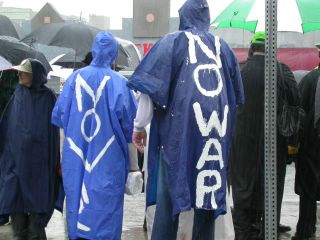What about Wal-mart, though?
The story's arc is reminiscent of A Bug's Life: A stranger (in this case, RJ the raccoon) joins a band of creatures to exploit their abilities, comes to love them, reveals his duplicity, expresses his feelings, and is forgiven. But this movie also contains several nods to the Greens: For example, upon discovering an SUV, RJ explains that humans need SUVs because "[we] are slowly losing [our] ability to walk." Another creature asks, "It's so big! How many humans does it carry?" And RJ answers, "Usually, one!" When the animals eat tortilla chips modeled after Doritos, RJ lists the chemical ingredients and there's an atomic-scale explosion. The film also nods to those who take issue with Bush's unilateral foreign policy. The greediest suburban property owner, upon learning of the illegality of the vermin extermination system she desires, exclaims, "I don't care if it's against the Geneva Convention! I want it!" And, unlike The Incredibles, which touted the biologically created nuclear family above all else, Over the Hedge suggests that "family" is what you make it.
This smart film isn't politically perfect, of course. The unmarried American female is demonized as a life-hating opportunist, and the only woman of color who acts as a main character in the film (Wanda Sykes) portrays a skunk with lines such as, "I look like a nest and smell like a swamp" and, "I can clear a room... that I can do." Still, compared to the character Legs in Toy Story and the "invisible" Violet in The Incredibles, the women in Over the Hedge give liberals much less about which to complain. Most troublingly, however, this movie also shared its promotional advertising with Wal-mart, the company that contributes most to sprawl and the collapse of our labor and ecosystems. I've struggled to make sense of this seeming hypocrisy, just as I've struggled to make sense of my own: I am liberal, single mother who, nonetheless, has spent hundreds upon hundreds of dollars on politically objectionable kid movies and the merchandise they've inspired.

